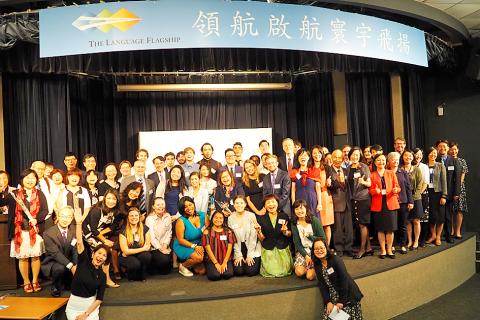The Chinese Overseas Flagship (COF) in Taiwan center, part of the US government-sponsored Language Flagship program, officially opened yesterday at National Taiwan University (NTU) in Taipei.
The Language Flagship is an undergraduate program that includes instruction in languages such as Arabic, Korean, Persian, Portuguese, Russian and Turkish under the US’ National Security Education Program (NSEP).
The NSEP was established in 1991 under the David L. Boren National Security Education Act that mandated the US secretary of defense to create such a program to provide scholarships for undergraduates, fellowships to graduate students and grants to US institutions to fund the study of countries and languages critical to the US’ national security.

Photo courtesy of the Ministry of Education
The COF in Taiwan center, which was established on June 3 and received its first batch of students last month, is one of two such centers in Asia; the other is at Nanjing University in China.
There had been one at Beijing Union University for several years, but the COF headquarters in the US is no longer using it for the capstone portion of the program, in which students who have completed four years of Chinese-language undergraduate courses take classes and intern in professional environments.
The Taipei center has 22 US students who have received scholarships of more than US$10,000 a year to study in Taiwan, center director Chao Der-lin (趙德麟) said at the opening ceremony.
Chao is a professor and head of the Chinese division at Hunter College in New York City as well as the director of that school’s Chinese Flagship center.
Hunter is one of the 12 universities that comprise the domestic Chinese Flagship in partnership with the US Department of Defense, and it has partnered with NTU to run the Taipei facility.
Aside from studying language and subjects related to their field of interest at NTU, the students will be able to intern at Taiwanese businesses and organizations, NTU said.
In a speech at the opening ceremony, American Institute in Taiwan Director Brent Christensen said that Taiwan is a good place to learn Chinese due to its safe environment, hospitable people and diverse culture.
Christensen encouraged the students to make the most out of their 10-month stay in Taiwan, saying that what he learned in Taiwan on his first overseas diplomatic assignment has helped his career.
Deputy Minister of Foreign Affairs Hsu Szu-chien (徐斯儉) said that the COF Taiwan Center is a milestone of US-Taiwan educational cooperation that symbolized strong Taiwan-US relations.
NTU already has a storied reputation for running intensive Mandarin language-training programs. Stanford University established a Mandarin training center on NTU’s campus in 1961, which two years later became the Inter-University Program (IUP) and over the next three decades set the standard for instruction in modern and classical Chinese.
In 1997, the US universities involved in the IUP moved the program to Tsinghua University in Beijing, while NTU assumed full administration for continuing the program on its campus, which it renamed the International Chinese Language Program.

CHAOS: Iranians took to the streets playing celebratory music after reports of Khamenei’s death on Saturday, while mourners also gathered in Tehran yesterday Iranian Supreme Leader Ayatollah Ali Khamenei was killed in a major attack on Iran launched by Israel and the US, throwing the future of the Islamic republic into doubt and raising the risk of regional instability. Iranian state television and the state-run IRNA news agency announced the 86-year-old’s death early yesterday. US President Donald Trump said it gave Iranians their “greatest chance” to “take back” their country. The announcements came after a joint US and Israeli aerial bombardment that targeted Iranian military and governmental sites. Trump said the “heavy and pinpoint bombing” would continue through the week or as long

TRUST: The KMT said it respected the US’ timing and considerations, and hoped it would continue to honor its commitments to helping Taiwan bolster its defenses and deterrence US President Donald Trump is delaying a multibillion-dollar arms sale to Taiwan to ensure his visit to Beijing is successful, a New York Times report said. The weapons sales package has stalled in the US Department of State, the report said, citing US officials it did not identify. The White House has told agencies not to push forward ahead of Trump’s meeting with Chinese President Xi Jinping (習近平), it said. The two last month held a phone call to discuss trade and geopolitical flashpoints ahead of the summit. Xi raised the Taiwan issue and urged the US to handle arms sales to

State-run CPC Corp, Taiwan (CPC, 台灣中油) yesterday said that it had confirmed on Saturday night with its liquefied natural gas (LNG) and crude oil suppliers that shipments are proceeding as scheduled and that domestic supplies remain unaffected. The CPC yesterday announced the gasoline and diesel prices will rise by NT$0.2 and NT$0.4 per liter, respectively, starting Monday, citing Middle East tensions and blizzards in the eastern United States. CPC also iterated it has been reducing the proportion of crude oil imports from the Middle East and diversifying its supply sources in the past few years in response to geopolitical risks, expanding

Pro-democracy media tycoon Jimmy Lai’s (黎智英) fraud conviction and prison sentence were yesterday overturned by a Hong Kong court, in a surprise legal decision that comes soon after Lai was jailed for 20 years on a separate national security charge. Judges Jeremy Poon (潘兆初), Anthea Pang (彭寶琴) and Derek Pang (彭偉昌) said in the judgement that they allowed the appeal from Lai, and another defendant in the case, to proceed, as a lower court judge had “erred.” “The Court of Appeal gave them leave to appeal against their conviction, allowed their appeals, quashed the convictions and set aside the sentences,” the judges